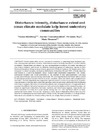Identificador persistente para citar o vincular este elemento:
https://accedacris.ulpgc.es/jspui/handle/10553/74836
| Título: | Disturbance intensity, disturbance extent and ocean climate modulate kelp forest understory communities | Autores/as: | Wernberg, Thomas Couraudon-Réale, Marine Tuya, Fernando Thomsen, Mads |
Clasificación UNESCO: | 241705 Biología marina 251001 Oceanografía biológica |
Palabras clave: | Disturbance Ecklonia Radiata Facilitation Functional Groups Ocean Climate, et al. |
Fecha de publicación: | 2020 | Publicación seriada: | Marine Ecology - Progress Series | Resumen: | Disturbances often control community structure by removing large dominant species, allowing new species to colonize. Disturbances vary in intensity and extent, and their effects on resident communities can depend on local environmental conditions. We tested the effects of disturbance intensity and extent on different functional groups of understory species in kelp forests at 4 locations along an ocean climate gradient in Western Australia. We hypothesized that, compared to intact canopies, increasing disturbance intensities (50 and 100% of kelp removal) and extents (2, 4 and 8 m diameter) would promote light-dependent competitors (turf, foliose, articulated coralline and fucoid seaweeds) at the expense of less light-dependent functional groups (invertebrates and encrusting seaweeds). We also hypothesized that these effects would be most pronounced at warmer relative to cooler locations, where metabolic and ecological rates are faster. The first hypothesis was supported; light-dependent understory groups (turfs, in particular) increased, while less light-dependent groups (crusts in particular) decreased with increasing disturbance regimes. However, the second hypothesis was not supported; even though understory communities differed between locations and turf covers were highest at the warmest location, we found no significant interactions between locations and disturbance regimes. Importantly, our results revealed that even small-scale partial canopy loss can have significant effects on kelp-associated communities. The implied community-wide, density-dependent effects have implications for the management and conservation of kelp forests, because restoration of ecological functions must also consider the density of kelp forests, not simply their presence or absence. | URI: | https://accedacris.ulpgc.es/handle/10553/74836 | ISSN: | 0171-8630 | DOI: | 10.3354/meps13443 | Fuente: | Marine Ecology Progress Series [ISSN 0171-8630], v. 651, p. 57-69, (Octubre 2020) |
| Colección: | Artículos |
Citas SCOPUSTM
19
actualizado el 08-jun-2025
Citas de WEB OF SCIENCETM
Citations
22
actualizado el 08-feb-2026
Visitas
206
actualizado el 15-ene-2026
Descargas
122
actualizado el 15-ene-2026
Google ScholarTM
Verifica
Altmetric
Comparte
Exporta metadatos
Los elementos en ULPGC accedaCRIS están protegidos por derechos de autor con todos los derechos reservados, a menos que se indique lo contrario.
